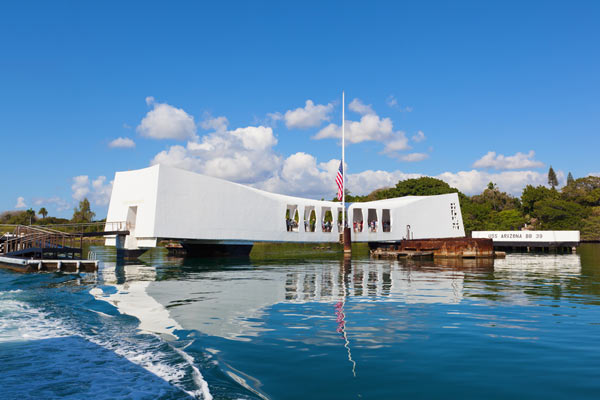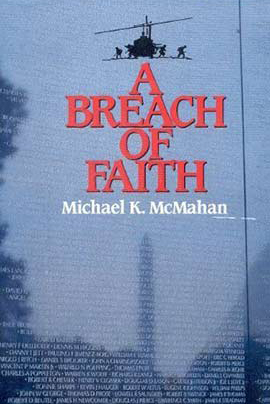On December 7, 2016 my wife and I were visiting the Pearl Harbor Museum in Honolulu, Hawaii for the second time. We had been to the museum during my Army R&R in May 1969 when I was nine months into my combat tour in Vietnam. On both occasions we spent time at the USS Arizona Memorial where the bodies of 1,100 sailors are entombed in a watery grave with their great battleship. The ship is visible in shallow water beneath an elegant, white structure that includes a solemn marble shrine where the names of all the fallen heroes are recorded. A palpable sense of reverence overwhelms visitors as they approach this sacred site.
On our more recent visit, as we stepped off the boat that carried us to the monument, three navy divers were delivering the cremated remains of a World War II veteran who had survived the attack and more than seven decades of life that followed. He had asked that his last resting place be among the fellow seamen he had lost on December 7, 1941.
I recently called one of the best friends I have had in my lifetime. We were classmates in OCS, and we fought together in Vietnam. I told him I was calling because it was December third.
“Why is that?” he asked.
“You know,” I said, “the day Delta Company was ambushed, and we lost 20 KIA.”
He said, “How many days do you remember?”
I realized he didn’t want to talk about Vietnam, so I moved on to children and grandchildren and topics that made him smile and laugh.
But the truth is I do remember many days as a combat soldier—September 30, November 2, November 6, December 3, February 19, May 10 and others. These were days when adrenaline and my good Army training drove me through paralyzing fear and helped me do my job. It was after the battles, as the wounded were being evacuated, that there was always a profound sense of grief that tears your heart out and forces you to question everything you thought you knew about life and death and all that lies between. When the men you know are hit and horribly wounded or killed and you are spared, a sour cocktail of emotions and sensations morphs into the bitter guilt of a survivor.
The attack on Pearl Harbor started at 7:48 a.m. The U.S. Pacific fleet sat vulnerable in a small harbor as 353 Japanese aircraft swarmed the island, overcoming its defenses in two separate waves. All eight U.S. Navy battleships in the harbor were severely damaged. Four sank, including the USS Arizona. There were 2,403 Americans killed and 1,178 wounded. The Japanese suffered just sixty-four men killed.
The next day shock and anger rippled across America from coast to coast. President Franklin Roosevelt declared December 7, 1941 a day that would live in infamy. The U.S. Congress declared war on Japan. America was pulled into World War II on two fronts, in Europe and the Asian Pacific. The next four years challenged every fiber of courage and commitment the country could muster. But we met this great challenge. The Greatest Generation came together to supply a massive military force as brave soldiers, sailors, airmen, and Marines won their battles. Tyranny was defeated. World order was restored.
Many of the veterans who fought those battles, including the one they lost at Pearl Harbor on December 7, 1941, may have been like me. They remembered every day they spent in intense combat. The names of their fallen friends were permanently written in their hearts as clearly as they were later carved into marble walls. The bond they had never weakened. Though a lifetime of six or seven decades may have followed, that strong bond still drives them to sunken ships where they join the fallen and their guilt is finally washed away. May God bless them all for battles won and lost, for inspiring courage and quiet dignity, and for honor beyond measure.



Thanks Michael for the article on Pearl Harbor.
When my ship, USS NEWPORT NEWS CA 148, was enroute Vietnam 1967, we docked in Pearl, tied up to the right of the USS ARIZONA. It was an Erie feeling recalling what happened on December 7, 1941 and not knowing what we were facing going into Combat as mere boys on a ship very similar to the Battleships destroyed that awful day in 1941 not withstanding all the lives lost that day plus the next four years.
My ship was very fortunate to have not taken a direct hit even though we were fired upon many times. I give our Captains, McCarty and Snyder, credit for their ability to manuever us out of harm’s way.
My apologies for bending your ears listening to me ramble on. I hope for your family a Very Merry and Blessed Christmas!
Stan, glad you had good leaders. I was also blessed with one of the best infantry company commanders ever. In fact, then Captain Bary McCaffrey and later retired General Barry McCaffrey was inducted into the infantry hall of fame at Fort Bening, Georgia. I was proud to be there supporting Barry when he was honored a few years ago. Thank you for serving, Stan and for your comments.